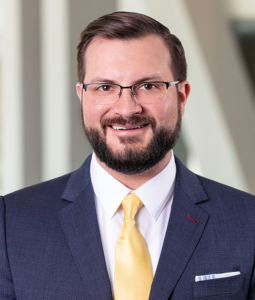 Tell us about your practice.
Tell us about your practice.
I have a broad commercial litigation practice with particular emphases on intellectual property, government contracts, healthcare, and financial services disputes. I have handled disputes of all sizes in federal and state courts across the country and in various alternative dispute resolution forums. I also counsel businesses on trademark and brand protection strategies.
What is an interesting trend happening right now related to your field of practice?
Shock has become increasingly valuable to corporate brands in recent years. Although not all brands can capitalize on shock value, companies like French Connection UK (FCUK) have generated significant attention from pushing the envelope. Section 2(a) of the Lanham Act currently allows the U.S. Patent and Trademark Office to refuse registration of any trademark that “[c]onsists of or comprises immoral . . . or scandalous matter.” In December 2017, the U.S. Court of Appeals for the Federal Circuit held that this ban on immoral or scandalous marks constitutes an impermissible content-based restriction on speech in violation of the First Amendment to the U.S. Constitution. The government has filed a petition for writ of certiorari, asking the U.S. Supreme Court to hear the case. As shock value becomes an increasingly important marketing tool in the U.S. economy, this pending decision could substantially influence the path companies pursue with arguably “immoral” or “scandalous” brand or product names. This past fall, I wrote two articles further examining this topic for IPWatchdog: “Supreme Court Asked to Consider Immoral or Scandalous Trademarks” (October 11, 2018) and “Matal v. Tam: What’s New and What to Watch in Registration of Disparaging, Immoral, and Scandalous Trademarks” (September 28, 2018).
Why did you choose to pursue a career in the legal field?
My route to a career as a commercial litigator has been delightfully circuitous. Music has always been a passion of mine. After growing up in the St. Louis suburbs, I attended Belmont University in Nashville with wide-eyed hopes of becoming a rock star. As part of Belmont’s Music Business program, I was required to take courses in business law and copyright law. I was particularly drawn toward a legal career after reading the U.S. Supreme Court’s opinion in Campbell v. Acuff-Rose, a copyright case concluding that 2 Live Crew’s commercial parody of Roy Orbison’s song “Pretty Woman” was considered fair use under the Copyright Act. Even wider eyes drew me to the west coast entertainment world when I attended law school at Pepperdine University. My interests again shifted in law school when I found both success and joy in trial and appellate advocacy. Although I will admit a bit of envy when I see college friends on the stage at music awards shows, I am grateful for an unexpected series of events that led me to a challenging yet extremely fulfilling career as a civil litigator.


